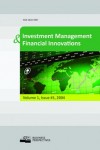Determinants of credit default swaps implied ratings during the crisis: was sovereign risk mispriced?
Determinants of credit default swaps implied ratings during the crisis: was sovereign risk mispriced?
Author(s): Maria Alberta Oliveira, Carlos SantosSubject(s): Economy, Supranational / Global Economy, Transformation Period (1990 - 2010), Present Times (2010 - today), Fiscal Politics / Budgeting
Published by: ТОВ “Консалтингово-видавнича компанія “Ділові перспективи”
Keywords: credit default swaps; sovereign risk; ratings; macro-financial fundamentals; panel ordered probits;
Summary/Abstract: This paper addresses the question of whether sovereign risk pricing was related to macroeconomic fundamentals, between 2007 and 2015, in a sample of OECD countries. The authors argue that the conflicting evidence in the literature is due to poor methodology options. The researchers innovate by modelling sovereign credit default swaps implied ratings as our sovereign risk proxy, instead of spreads, avoiding common pitfalls. Furthermore, the authors improve the variable selection, model specification and the econometric procedures used. A panel ordered probit model is chosen, assuring robust inference. The authors relax the parallel lines assumption, allowing for rating-varying coefficients of explanatory variables. The result is the first congruent model of sovereign risk during the years of the financial crisis and of the Euro Area crisis. Fiscal space variables, economic activity indicators, variables pertaining to external imbalances, and contagion proxies are relevant, with effects matching theory priors. The scientists clarify conundrums in the previous literature, posed by lack of significance of some macro fundamentals and by puzzling signs of some estimated coefficients. Moreover, this is the first paper to estimate not only the global risk premium, but also the impact of changing risk aversion. The authors find no support for claims of sovereign risk mispricing during the sample period. The results allow relevant policy conclusions, namely concerning the validity of different fiscal consolidation paths in financially distressed countries.
Journal: Investment Management and Financial Innovations
- Issue Year: 15/2018
- Issue No: 3
- Page Range: 1-14
- Page Count: 14
- Language: English

